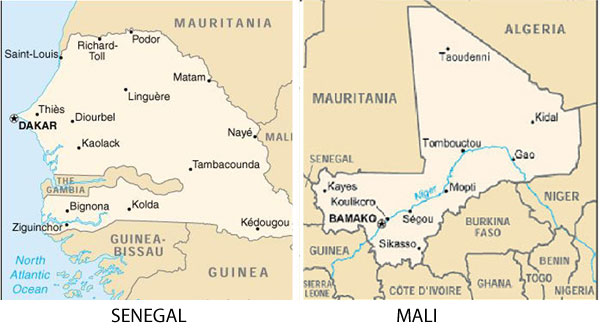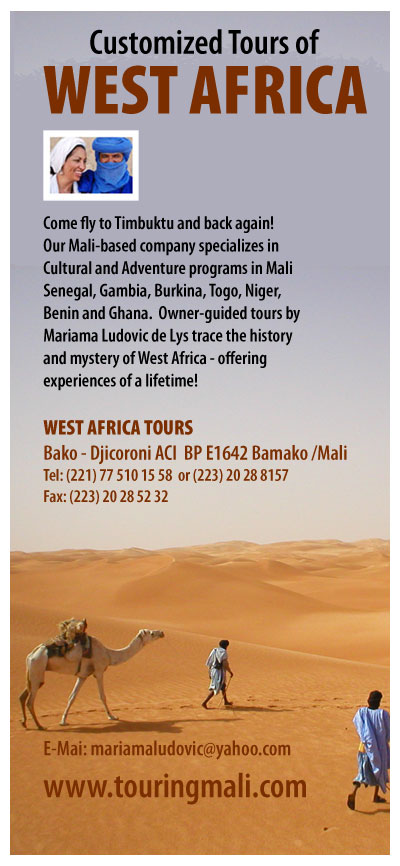

 ,,,,,,
,,,,,,
|
|
Day 1: BAMAKO Sunday 02 January 2011 Assistance for police and customs formalities and transfer by coach to the hotel - 02h00 Bamako: "Bamako is a Bambara word meaning "Crocodiles River". In 1806 Bamako was a Bozo fishing and trading community of about 6000 people. In 1883, the French captured the town and in 1908 Bamako became their regional seat of power and they built their residence on the hill of Koulouba. At the independence in 1960, Bamako was chosen as the capital ..." Arrival to Bamako. Welcome by West Africa Tours team followed with your transfer to the hotel. Overnight at Hotel or Guest House
Day 2: BAMAKO / SEGOU Monday 03 January 2011 Road: 240 Km - 04h00 Breakfast and depart to Segou. Crossing of Saharan typical landscapes and villages.
On route we will make a stop to visit Segoukoro which means in Bambara language the "Old Segou". It is the location of Bambara Kingdom's former capital… You can see the vestibule and the tomb of Mamary Biton Coulibaly, the Founder of the Kingdom and try to understand how Animism and Muslim were intimately bound. Arrival to the hotel, check-in followed with your lunch. In the afternoon, we will have the city tour that includes the pottery market along the Niger River banks and the « Colonial Quarter ». Admire the beautiful Sudanese-style colonial architecture.The local beer fabric, the women shops for their beautiful bogolan. Dinner and overnight at hotel.
Day 3: SEGOU / MOPTI Tuesday 04 January 2011 Road: 405 Km - 06h00 Breakfast and depart to Mopti. Several photo-stops in Bambara and Bobo villages located all along your way. Lunch on route. Stop in Ganga to admire balafon players exhibition. Arrival to Mopti, check-in at hotel and go for the town visit: - the lively fishing harbor on the Bani River where you can still find slabs of salt for sale in a continuation of an age-old trade between Morocco and Mali ; - the artisans' souks with traditional traders offering a variety of locally-produced commodities and beautiful artfacts; - the traditional boat factory, the beautiful Sudanese-style mosque of Komoguel, and the bustling local market. Dinner and overnight at hotel.
Day 4: MOPTI / TIMBUKTU Wednesday 05 January 2011 Road and desert track with 4x4 - 400 Km: 06h00 + Ferry-boat crossing: 45 min Breakfast and early depart to Timbuktu. Lunch at Douentza. Arrival at Timbuktu at the end of the day. Dinner and overnight at hotel or guest house. Day 5: TIMBUKTU / ESSAKANE Thursday 06 January 2011 Town visit and desert track with 4x4 - 60 Km: 02h00 Breakfast and go for the mysterious town visiting Timbuktu: Timbuktu was formerly a great commercial trading city and an international centre of Islamic learning. The city was probably founded in the late 11th century AD by Tuareg nomads. Tuareg formed one of the most ancient tribal people of the Sahara. They speak a Berber language, Tamacheq, and have their own alphabet. In ancient times, the Tuareg controlled the trans-Sahara routes and substantially contributed in the expansion of Islam in sub-Saharan Africa even though they retained however some of their older rites. Today, the Tuareg symbolize the mysteries of the Sahara and continued to be seen as the Masters of the Desert. Sites to visit: -The ancient mosques including the famous mosque of Djingareiber the oldest and the famous Sankore whose reputation spanned all across North Africa and Europe as a leading Islamic academy for centuries. -The Ahmed Baba Centre where ancient books (some dating from the 14th century AD) are still preserved. -The explorers (Gordon Laing, Rene Caillé, Henrich Barth) houses. After the lunch, you will depart for Essakane desert Festival site located 60 km from Timbuktu. On route visit to the Tuareg village of Farach famous for has been a place where Tuareg people had fiercely resisted against colonial penetration. Meet with the elders and discover local population activities and women co-operative association. Continuation 2 Km to the site of the festival. Opening ceremony. Dinner followed by music show in the night. Overnight under Tuareg tents
Day 6: ESSAKANE Friday 07 January 2011 Essakane: Created in January 2001, the "festival au désert" is held every year in Essakane, two hours from Timbouctou in Mali. This Festival seeks its origin in the big traditional Touareg festivities, as Takoubelt in Kidal and Temakannit in Tombouctou, which represented for long time a place for decision making and exchange of information among the different communities. At the beginning, there were songs and touareg dances, poetries, camel rides, games, etc. Today, the Festival is opened to the external world and welcomes artists from other Malian regions, other African countries, but also from Europe and from the whole world. During three days, around 30 artistic groups are invited from all around the world to present their art. Due to the attention of the media and to the huge logistic effort that it is mobilizing, the Festival is now included among the Big Modern Festivals, though it maintains its traditional cultural aspects. Breakfast. Visit to the cultural stands. Tuareg traditional music and dances. Depart to Bankor (15 Km) to see desert unique archeological site. Discover the old Tuareg settlement. Admire the beautiful panoramic view on Lake Faguibine. Drive back to Essakane. Lunch and relaxation with Sahara desert blue people. Dinner followed by music show in the night. Overnight under Tuareg tents
Day 7: ESSAKANE Saturday 08 January 2011 Breakfast. Visit to the cultural stands. Tuareg traditional music and dances. Lunch and relaxation with Sahara desert blue people. Tea party. Camel race...Dinner followed by music show in the night. Overnight under Tuareg tents
Day 8: ESSAKANE / MOPTI Sunday 09 January 2011 Desert track with 4x4 - 460 Km: 10h00 + 01h ferry boat crossing Breakfast and drive back to Mopti. You will have your Lunch on route. Arrival to Mopti at the end of the day. Dinner and overnight at Hotel
Day 9: MOPTI /DJENNE Monday 10 January 2011 Asphalted road: 150 Km - 02h00 Breakfast and depart to Djenne the eternal town. Arrival followed with a walking tour of the city.
DJENNE: "Founded in the 4th century, Djenne has scarcely changed since the Middle Ages. In the 13th-15th centuries, Djenne was a rival of Timbuktu for the wealth of the Trans-Saharan trade. The city is located on an island in the inland Niger delta, and is surrounded by mud brick walls. As well as making a visit to the archaeological site of Djenné-Djeno that looks backward in time over a 1.000 years. Generation after generation, a guild of highly skilled master-builders, the Baris, have ensured Djenne's architectural integrity. The atmosphere in the streets brings the traveller back to medieval times." Sites to visit and to see: The town weekly market of Monday , the particular architecture, the largest mud made mosque in the world, the chief's house, the sacred well of Nana Wangara, the tomb of the young woman who was walled in alive to give the town prosperity. Dinner and overnight at hotel.
Day 10: DJENNE / SONGHO / SANGHA Tuesday 11 January 2011 Road by 4x4 - 230 Km: 04h00 + Ferry-boat crossing: 20 min Breakfast and depart to Dogon country. Visit to Dogon villages located on the plateau, like Niongono, located on a peak and the picturesque village of Songho for its circumcision grotto. Travel a short distance to Bandiagara for the lunch and proceed to Sangha in the heart of Dogon Country. Check-in at hotel. Dinner and overnight.
Day 11: SANGHA / MOPTI Wednesday 12 January 2011 Breakfast and transfer depart for a full day discovering of the way of life of Dogon people. Today will require a bit of walking and stamina as we visit the picturesque Dogon villages along the World Heritage listed Bandiagara cliffs like Daga, Banani ,Ireli…These villages are small and built out of local stone, again with the granaries being topped by thatched roofs… "Prepare: hats for the sun, good walking shoes for the escarpments, comfortable clothes, small bag, sunglasses & water" During your trek towards the Dogon villages along the Bandiagara cliffs , you will see the «impure women's» house, the tellem caves, the togunas and the fetish altar of the Hogon (The Dogon people's traditional and religious leader), … As we walk from village to village we will get a good insight into lives of the Dogon as well as an appreciation for their arts and crafts…Pic-nic lunch at Banani and trekking back to Sangha.
Before entering to Sangha, we will visit the Dogon Traditional Devin who conformly to the tradition still predicts the future to Dogon people…and visitors. We will then admire the Dogon masks dance (optional). Dogon dancers are world-renowned and often consist of dances on stilts while wearing broad-brimmed hats and amazing facial decorations. Continuation to Mopti. Arrival at the end of the day. Dinner and overnight at your hotel.
Day 12: MOPTI / BAMAKO Thursday 13 January 2011 Road 650 Km - 09h30 Breakfast and depart to Bamako. Lunch on route. Arrival to Bamako at the end of the day. Dinner and overnight at hotel or guest house.
Day 13: BAMAKO / DEPARTURE Friday 14 January 2011 Breakfast and go for Bamako city tour. The artisan and the fetish market. The National Museum: It contains some beautiful ethnographic pieces from many of Mali's ethnic groups...The panoramic view from point G on the escarpment north of the city... Lunch in a local restaurant. Time at leisure. Dinner in a typical restaurant of the town and transfer to airport for final departure.
PRICE PER PERSON : 1780 EUR These prices include: - Accommodation in full board based on sharing room. Hotels: Hotel Le Mandé HotelAuberge in Segou Hotel Flandre in Sévaré (Mopti)
Mariama Ludovic de Lys
Directrice WEST AFRICA TOURS BP E 1642 Bako-Djicoroni Tel : (221)77 510 15 58/ (223) 20 28 8157 Fax: (223) 20 28 52 32 BAMAKO /MALI www.Touringmali.com |









 DETAILED
PROGRAM
DETAILED
PROGRAM